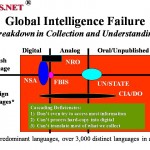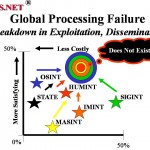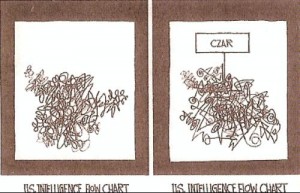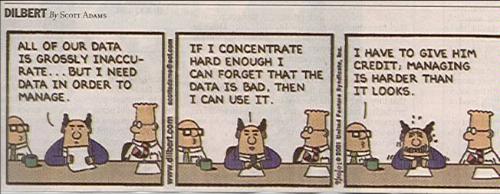Review: Daydream Believers–How a Few Grand Ideas Wrecked American Power
5 Star, Congress (Failure, Reform), Corruption, Diplomacy, Empire, Sorrows, Hubris, Blowback, Executive (Partisan Failure, Reform), Impeachment & Treason, Insurgency & Revolution, Intelligence (Government/Secret), Iraq, Politics, Power (Pathologies & Utilization), Religion & Politics of Religion, War & Face of Battle Together with a Few Other Books, All You Need to Know, March 21, 2008
Together with a Few Other Books, All You Need to Know, March 21, 2008
Fred Kaplan
The author is kinder to the protagonists than they merit.
I give the author high marks for making the case early on in the book that the world did NOT change after 9-11, and that what really happened was that the coincidence of neo-conservative back-stabbing and Bush's well-intentioned evangelical village idiot view of freedom and democracy.
The author does a fine job of reviewing how after 9-11 we were faced with two choices, the first, going for empire (“we make our own reality”) or revitalizing alliances. The neocons in their ignorance called for regime changes, but the author fails us here by not understanding that both political parties love 42 of the 44 dictators, those that “our” dictators.
The author has many gifted turns of phrase. One talks about how their “vision” turned into a “dream” that then met “reality” and was instantly converted into a “nightmare.”
The author adds to our knowledge of how Rumsfeld empowered Andy Marshall, and how the inner circle quickly grew enamored of the delusion that they could achieve total situational awareness with total accuracy in a system of systems no intelligent person would ever believe in.
The author highlights two major intelligence failures that contributed to the policy bubble:
1. Soviet Union was way behind the US during the Cold War, not ahead.
2. Soviet economy was vastly worse and more vulnerable that CIA ever understood.
The author helps us understand that the 1989 collapse of the Berlin War created a furor over the “peace dividend” and the “end of history” that were mistaken, but sufficient to bury with noise any concerns about Bin Laden and Saudi Arabian spread of virulent anti-Shi'ite Wahabibism from 1988 onwards.
By 1997 Marshall and Andy Krepinevich were staking everything on Unmanned Aerial Vehicles (UAV), high speed communications and computing (still not real today), and precision munitions.
The author provides a super discussion of Col John Warden's “five rings” in priority order: 1) leadership and C4I; 2) infrastructure; 3) transportation; 4) population (again, war crimes); and finally, 5) the enemy. The author is brutal in scoring the campaign designed by Col Warden a complete failure. It…did…not…work (in Gulf I).
I cannot summarize everything, so a few highlights:
+ Taliban quickly learned how to defeat US overhead (satellite) surveillance–remember, we do not do “no-notice” air breather imagery any more, except for easily detected UAVs, with mud as well as cover and concealment. .
+ Excellent account of the influence on Rumsfeld of George Tenet's failure to satisfy him during a missile defense review. It became obvious to all that the U.S. Intelligence Community a) no longer had a very high level of technical mastery on the topic; and b) was so fragmented as to make the varied analytic elements deaf, dumb, and blind–not sharing with each other, using contradictory data sets, the list goes on.
Page 187 is the page to read if you are just browsing in the bookstore:
Summarizing 2007: “Not so much a return to realism as a retreat to randomness.” Also: “Grand vision was shattered by reality. Policies were devised piecemeal; actions were scattershot, aimless.” And: “put forth ideas without strategies; policies without process; wishes without means.” Devastating.
So many other notes. Here are a tiny handful:
+ Speechwriter Michael Gersen connected with Bush on an evangelical level, wrote major speeches, in the case of a foreign policy speech, without actually consulting any adult practitioners.
+ Joseph Korbel was both Madeline Albright's father and Condi Rice's educational mentor–talk about a non-partisan losing streak!
+ American Enterprise Institute and Richard Perl used Natan (Anatoly) Sharansky to impress Cheney and subvert Bush by reframing the Israeli genocide against the Palestinians as the first 21st Century war between terrorism (the hapless Palestinians) and democracy (the Israeli's).
+ He credits Eliot Abrams with devising the unique linkage between American Jews whose numbers and influence have been declining, and the Evangelical Christians whose influence peaked with Bush-Cheney.
+ He slams General Tommy Franks for providing assurances and making promises he could not keep with respect to settling and stabilizing the towns by-passed or over-run by the US Army.
+ The author is misleading in his account of the Saudi-Powell discussions on how an election would lead to radical Islamics in charge (as opposed to despotic, perverted spendthrifts).
+ Rumsfeld Lite going into Iraq meant that a quarter million tons of ordnance was looted by insurgents, which is what cost us four years time. General Shinseki is vindicated.
+ For the first time I learn of a planned Truth and Reconciliation Commission.
+ The author introduces Ahmed Chalabi but does not fully understand this man's crimes as well as his special relationship with Iran. Iran used him to get the USA to depose the Taliban and Sadaam Hussein, , and to lure the entire US military into a quagmire.
+ Department of State, Mr. White in particular, got it right every time.
+ Legitimacy and stability must come before elections.
+ Hezbollah win in Lebanon dealt a crushing blow to the Bush delusions.
+ Bush refused to deal with Syria and Iran throughout. I am reminded of how Civil Affairs was told in the first five years of the war to blow off the tribal leaders and imams, and only now are they being allowed to get it right.
+ Useful account of three failed Public Diplomacy tenures (Charlotte Beers, Margaret Tutwiler, Karen Hughes (who waited six months so her son could leave for college–so much for the importance of that job….)
+ USA sent $230 million in aid to Lebanon, while Iran poured in $1 billion via Hezbollah (meanwhile, the Chinese do the same everywhere else).
Page 191 is glorious: Bush's strategies were “based on fantasies, faith, and a willful indifference toward those affected by their consequences.”
Page 192: the real divide is “between the realists and the fantasists.”
The author quite properly slams the Democrats for not having an original idea, plan, program, bill, budget, or moral thought.
He ends by suggesting that multinational consensus is still the true litmus test for the sensibility and sustainability of any endeavor.
On this note, I conclude that five stars are right where this book should be. Incomplete, but original and provocative. Bravo.
Other recommendations:
Breaking the Real Axis of Evil: How to Oust the World's Last Dictators by 2025
Web of Deceit: The History of Western Complicity in Iraq, from Churchill to Kennedy to George W. Bush
Legacy of Ashes: The History of the CIA
The Sorrows of Empire: Militarism, Secrecy, and the End of the Republic (The American Empire Project)
DVD Why We Fight
Vice: Dick Cheney and the Hijacking of the American Presidency
The Price of Loyalty : George W. Bush, the White House, and the Education of Paul O'Neill
Fiasco: The American Military Adventure in Iraq
Rumsfeld: His Rise, Fall, and Catastrophic Legacy

Review: Still Broken–A Recruit’s Inside Account of Intelligence Failures, from Baghdad to the Pentagon
5 Star, Intelligence (Government/Secret) If the SecDef and DNI Could Read One Book, This is the One, February 12, 2008
If the SecDef and DNI Could Read One Book, This is the One, February 12, 2008
A. J. Rossmiller
DNI Mike McConnell is a good man trapped in a very bad pyramidal system that is inherently duplicitous. He is presiding over what retiring Defense Senior Intelligence Leader Rick MacKenzie calls, in this book, “the underlying insanity of our intelligence agencies.”
As the author of the original strike, On Intelligence: Spies and Secrecy in an Open World, honored with a foreword by Senator David Boren, former chairman of the Senate Select Committee on Intelligence, and several other books moving the ball forward in the public (since our government is broken, not just the intelligence community) I must confess that the author of this book pursues a path that is inherently attractive to me. I have a bias for the truth, and a bias against the $60 billion a year in insane waste that Mike McConnell is presiding over.
Out of the ten books that arrived today, this is the one I could not put down. Below are my summative highlights, and then other books that support this author.
For a first time author and a young man at that, my first flyleaf note reads, underlined with exclamation marks: ABLY WRITTEN! By a MATURE Person!
There is no index nor bibliography in this book. I absorbed it at face value, as a first-person narrative of a patriot who joined the intelligence community for the right reasons, and left the sinking ship after honorably pointing out the flaws to his bosses, who remain typical not invested here lifers (this is generally the case across the IC).
+ Analysts segregated, no inter-regional, issue, or agency integration and interaction.
+ High turnover (for the last decade more analysts quit FBI every month than can be recruited–the best and the brightest do NOT like idiot bosses). This results in an inexperienced middle management as the dead-beats move up.
+ Products rarely reached the intended audience, and products finally reaching Secretary of Defense and the Joint Chiefs of Staff never ever resembled what actually started out as an honest pessimistic assessment.
+ Months of indiscriminate editiing resulted in drastic differences. I can attest from experience and the literature that CIA is just as ineffectual).
+ Many patriotic intelligence analysts as well as career military felt that the Administration and the flag officers took their eye off the ball, invading Iraq and creating infuriated nationalists, instead of focusing on a handful of terrorists.
+ Supervisors lied regularly to everyone.
+ Iraq was dust, mosquitos, heat, and constant organizational chaos and reorganization with virtually no real production that was actionable. The one exception was the “track and whack” group in which the author was fortunate to serve.
+ DIA failed to coordinate with the in-country Combined Intelligence Operations Center (CIOC) before it sent its single most significant contingent to Iraq. For that one right there I would hope Director of DIA figured out who embarrassed his agency and counseled the individual.
* Institutional knowledge (retained knowledge that outlives turnover) is virtually non-existent.
+ The tactical units in the field could not handle Top Secret or Top Secret communications and computing technology. I have this image in my head of an elephant trying to blow his nose down a straw to a gnat.
+ “Disaster continued to be perpetuated by failed leadership and the absence of a coherent intelligence or military strategy.”
+ Inter-agency choas in Iraq.
+ DIA complained about its analysts in Iraq working too hard because their overtime came out of its budget. This reminds of the message from CIA complaining about my asking to be reimbursed for hotel rooms when I had to go underground in El Salvador after an explicit by-name assassination threat from the Colonels running the country (they confused my effort5s to penetrate the extreme left with sympathy for the extreme left–I did not have it then, I certainly do now). The message said that since I was receiving a housing allowance, I could not have the hotel rooms approved. I had a very very good Chief of Station, a real talent, and as I like to recall the story, he sent back a one-liner: “What part of assassination do you not understand?” The DC-based officers tend to be pasty-faced overwight prima donnas with no real commitment to those in the field. This is true across all agencies, and especially FBI and DEA.
+ The author has the grace to include a snapshot of a more typical person in Iraq, a military reservist whose life has been essentially ruined by the cavalier manner in which Cheney and Rumsfeld decided to lie to the public, invade Iraq, let the contractors steal billions without doing the reconstruction, and now he comes back to a recession with no job.
+ The author says that many in Iraq, realizing they could neither complain nor repair their lot, “checked out mentally.” This breaks my heart.
+ A very important part of his book discusses how units sent to capture targets would often come back with 50 people they snapped up in the general area, each of them presumed guilty, each sent to “Abu G” for three months. The author is morally shaken by this, as I have been shaken by Mike Hayden's two impeachable offenses (warrantless wiretapping and rendition plus torture).
+ The author posits that Iraq is not an insurgency, but rather a unique mix of a failed state (remember, Rumsfeld would not allow the troops necessary to keep good order while reconstruction proceeded apace), criminal opportunism, especially kidnapping for ransom, a few fanatics, and a majority of outraged anti-occupation nationalists in three flavors (Sunni, Shi'ite, Kurd).
+ While in Iraq, occasionally commuting by helicopter to the Green Zone, an oasis in the desert, the author comments that US leaders, both in DC and in Iraq itself, were totally oblivious to the “turmoil and dissatisfaction in daily Iraqi life.” I am reminded of the exposes of how Blackwater and others have indiscriminately killed civilians, rammed cars driven by old men off the road, and so on.
+ DIA's Office of Iraq Analysis “had a veneer of control, under which minor anarchy raged.”
+ The DIA Way: Kiss Up, Kick Down (as the author experienced it–those I know in the JMITC, PGIP, and now the NDIC are a breed apart in a most positive way).
+ Idiocy of DoD priorities–too many flat screen TV's, not enough desktop computer terminals and screens.
+ In Iraq, US officers and media both seduced by English-speaking Iraqis, and totally oblivious to the deeper nuances available in indigenous language about domestic views, concerns, and links.
+ In the Pentagon, personally witnessed the politicization of analysis that continues to this day. Senior officers including the Navy J-2 Admiral now heading to CENTCOM J-2 as I understand it, always deleting pessimism and squelching reports on how badly reconstruction was going.
+ The real star in this book–but I totally respect this author and his good judgment in leaving the ship of fools–is DISL Rick MacKenzie. SecDef Gates and DNI McConnell would do well to read pages 176-177 of this book. For the rest of you, here are the highlights from MacKenzie's parting note to all that began with the underlying insanity quote above:
– Unified honest warning works, edited disparate warning is idiocy
– Human behavior is predictable, yet we like to count things and ignore the human factors
– We have no clue how alien we are to other cultures
– The indicators are never wrong. If we are true to the evidence (we are not) we will be right more often than not.
– Analysis is not the same as synthesis, diagnosis, or prognosis (nor would I add, is propaganda, deception, active lies to the public, or fabrication)
– Intelligence analysis is a profession in its own right. I am reminded of Jack Davis (search for <analytic tradecraft>.
The author concludes his book by dismissing most of what the US Intelligence Community accesses, and states that he has found useful truths in non-traditional online media, which he calls a “true meritocracy.”
I put this book down enormously impressed with this author's intelligence, balance, gifted writing, relevant observation, and total honesty. This is precisely the kind of patriotic committed person we are recruiting, and sadly, he is one of the few with the courage to leave. Those he left behind, absent a remarkable turning of the secret world right-side up and right-side in (search for <Forbes Reinventing Intelligence>) will, if they do not leave now, become the very bitter, narrow, inept, egotistical fools they now report to.
WOW. See also (I am limited to ten links, see my own books and the lists of hundreds of intelligence books I have reviewed, most of which support both my original 1988-2000 reclama, and this author's current reclama. NOTHING HAS CHANGED–WE'VE JUST POURED GASOLINE ON THE FIRE.
These books are intelligence books. I have an entire other list on political and falg officer malfeasance, high crimes, and misdemeanors. the first two books on the list below was not widely disseminated, but precisely matche the author's book, only for the CIA.
Lost Promise
Informing Statecraft
None So Blind: A Personal Account of the Intelligence Failure in Vietnam
Who the Hell Are We Fighting?: The Story of Sam Adams and the Vietnam Intelligence Wars
War Without Windows: A True Accout of a a Young Army Officer Trapped in an Intelligence Cover-Up in Vietnam.
Legacy of Ashes: The History of the CIA
Denial and Deception: An Insider's View of the CIA
Creating the Secret State: The Origins of the Central Intelligence Agency, 1943-1947
Body of Secrets: Anatomy of the Ultra-Secret National Security Agency
The last book, after summarizing all that NSA is trying to do, spending tens of billions of dollars very foolishly, ends by hoping the might one day achieve the ultimate computing device, weighing virtually nothing, powered by a tiny battery, able to make petaflops of calculations per nanosecond: “the human brain.”
Our government, and our secret intelligence community, are so totally screwewd up as to defy belief. I certainly would like to have a chance to restore the honor and intelligence of the secret world, but the chances of either (me or them) happening is right up there with the Second Coming. Our Nation will go down in flames because our government is clinically insane. See Running on Empty for why 2008 needs to break the backs of the two branches of legalized organized crime in this country, namely the Republican and Democratic parties. INDEPENDENCE!

Review: Comrade J
5 Star, Intelligence (Government/Secret) Valuable Insights Relevant Today, February 10, 2008
Valuable Insights Relevant Today, February 10, 2008
Pete Earley
I list some other recommended books below. What this book offers everyone are a few critical insights:
1) Clandestine human intelligence is now and will always be vastly more cost effective, nuanced, and valuable (when undetected), than the tens of billions of dollars we continue to waste on satellites that more often than not fail to launch, don't work once launched, drop to the Earth (with a dirty nuclear energy package that is dangerous), or–more recently–that can easily be disabled by Chinese precision energy pulses.
2) The single greatest advantage America had (lost for now) is its standing as a moral, legitimate society that truly epitomized the best of democracy, entrepreneurship, and civil free society. That is what attracted walk-ins before, and that is what will attract walk-ins in the future.
3) Last but not least, recruiting spies while they are in the USA is vastly easier, less risky, less expensive, and more valuable over-all, than fumbling around the way CIA does today, sending puppies in and out of official US Government buildings where both the gate guards and most of the clerical personal are indigenous nationals required to collaborate with their national counterintelligence service.
To be crystal clear: I believe that instead of wasting $60 billion of the taxpayers hard-earned dollars as we do today on satellites and spies and secrecy ($10 billion to keep “safe” all that information, 50% of which is not secret in the first place), we should give the spy service (banned from propaganda and influence ops)$6 billion a year and give the other $6 billion to an Open Source Agency under diplomatic auspices (ideally with the Multinational Decision Support Center in Tampa, occupying the rapidly vacating new furnished building that houses the Coalition Coorindation Center until it is finally phased out). The latter would have world class processing and sense-making, and support the UN, NGOs, Foundations, all legitimate governments and all legitimate corporations, with free early warning and pro-peace, pro-prosperity decision support.
See the images above. I am not making this up! Years of professional practice and study in just a handful of slides.
Apart from my own books, which I try not to link to:
A More Secure World: Our Shared Responsibility–Report of the Secretary-General's High-level Panel on Threats, Challenges and Change
Breaking the Real Axis of Evil: How to Oust the World's Last Dictators by 2025
Jawbreaker: The Attack on Bin Laden and Al Qaeda: A Personal Account by the CIA's Key Field Commander
First In: An Insider's Account of How the CIA Spearheaded the War on Terror in Afghanistan
Still Broken: A Recruit's Inside Account of Intelligence Failures, from Baghdad to the Pentagon
Legacy of Ashes: The History of the CIA
Blond Ghost
None So Blind: A Personal Account of the Intelligence Failure in Vietnam
The Very Best Men: Four Who Dared: The Early Years of the CIA
Body of Secrets: Anatomy of the Ultra-Secret National Security Agency

Review: Silent Steel–The Mysterious Death of the Nuclear Attack Sub USS Scorpion
5 Star, Empire, Sorrows, Hubris, Blowback, Executive (Partisan Failure, Reform), Intelligence (Government/Secret), Power (Pathologies & Utilization), Security (Including Immigration)
First-Rate Cover Story Great Human Interest, Service Loyalty, February 6, 2008
Stephen Johnson
EDIT of 9 Feb 09: There is evidently a very strong community of submariners, mostly officers, none of whom were in service at the time the incident happened, most of whom have little intelligence experience and very small libraries, who feel they and only they are qualified to judget between the two books. My two reviews stand. Normal people will find the other book much better in terms of trying to get to a reasonable semblance of the truth. Better yet, skip both books and go right to those I list below.
This a superb individual effort using normally available materials. It fully merits five stars because it can be bought and read simultaneously with Scorpion Down: Sunk by the Soviets, Buried by the Pentagon: The Untold Story of the USS Scorpion, which leverages Freedom of Information demands, direct invesdtigative journalism (HUMINT), and the end of the Cold War which produced a treasure trove of valuable primary materials. If you buy only one book, buy the other one but I find reading books in twos and threes is more interesting.
See for context, other reviews and if attractive, the books also:
The Rules of the Game: Jutland and British Naval Command
Very Special Intelligence: The Story of the Admiralty's Operational Intelligence Centre 1939-1945
Lost History: Contras, Cocaine, the Press & ‘Project Truth'
The Age of Missing Information (Plume)
Fog Facts: Searching for Truth in the Land of Spin
Legacy of Ashes: The History of the CIA
Manufacturing Consent: The Political Economy of the Mass Media
The Pathology of Power – A Challenge to Human Freedom and Safety
The Sorrows of Empire: Militarism, Secrecy, and the End of the Republic (The American Empire Project)

Review DVD: The Departed (Widescreen Edition)
5 Star, Crime (Organized, Transnational), Intelligence (Government/Secret), Reviews (DVD Only)
SPECATCULAR! Former Spy Loves This Movie, February 5, 2008
Leonardo DiCaprio
I have been trying to stave off insanity these past few weeks, as I have watched America ignnore the urgent need to exile Dick Cheney, send the village idiot home, and “get a grip” (see ten recommendations below).
I have watched this movie four times in the past year. Each time it gets better
First thought: Dicaprio is a world class actor, and the star in the Jason Borne series needs not explaining, except to note that he was a Southie and created the movie script for his first film as a Southie.
This movie is super at three levels:
Strategically: it shows how to penetrate organizations (crime ito police, police into crime) and how to reinforce and protect those penetrations with “back-ups.” CIA and FBI are both penetrated by everyone on the planet (including Guyana), but they are in denial and lie to us by pretending to be some sort of mythical “super” power. I deeply value my past as a spy beacuse it allows me to serve the public by saying IDIOCY AND DECEPTION.
Operationally, this movie is a cut above the average in showing how gangs work, how gang leaders are extremely intelligence and running operations against the police (the movie does not cover this, but most police departments across America are constantly monitored by criminal gangs that have used the back door to the police voice and radio communications systems to route a complete copy of every transmission or conversation to a third site. Cops are on the payroll and do not care about operational security. Criminals understand the value of couter-intelligence and intelligence.
At the tactical level, from wide beaches for executionn to marshes with the unexpect banker getting laid, the movie is fully satisfactory.
I have come to the conclusion that governments and religions are a form of “legal” organized crime that We the People need to “shut down.” ENOUGH.
I have been an undercover officer, in a combat zone as well as more normal locations, I have felt the terror of being exposzed, helpless, and subject to immediate execution (in El Salvador, a direct threat to execute me from the Colonels in charge of the country), and I consider this movie to be, easily, in the top ten alltime great movies about law enforcement, honor, and so one.
One nit: real spies, and the traitors they handle, do not use cell phones. Imagine a web cam following you everywhere. A cell phone can be turned on remotely to become a microphone recording non-cell phone conversations. That is the only unrealistic aspect of this otherwise superb movie.
A Real Pleasure!!!!
Botttom line: plot A+ actors A+ script A+ Execution A+
WOW. This is a GREAT MOVIE. See also:
Democracy's Edge: Choosing to Save Our Country by Bringing Democracy to Life
The Cheating Culture: Why More Americans Are Doing Wrong to Get Ahead
Breach (Widescreen Edition)
Serpico (Widescreen Edition)
The Informant: A True Story
The Battle for the Soul of Capitalism
Running On Empty: How The Democratic and Republican Parties Are Bankrupting Our Future and What Americans Can Do About It
Vice: Dick Cheney and the Hijacking of the American Presidency
The New Craft of Intelligence: Personal, Public, & Political–Citizen's Action Handbook for Fighting Terrorism, Genocide, Disease, Toxic Bombs, & Corruption

Review: Scorpion Down–Sunk by the Soviets, Buried by the Pentagon: The Untold Story of the USS Scorpion
5 Star, Intelligence (Government/Secret), Power (Pathologies & Utilization), Security (Including Immigration) Extraordinary Tale of Courage, Possible Dishonor, and Reality, February 4, 2008
Extraordinary Tale of Courage, Possible Dishonor, and Reality, February 4, 2008
Ed Offley
Edit of 25 Feb 08: The Admirals are apparently worried about something. They have squelched our proposed public debate between the two authors, ordering the submariners not to attend. So much for open minds. I recommend both books–the Admirals confirm with their fear which of the two is closer to the mark.
I stand my by review of both books, both are excellent, and both present us with an opportunity to evaluate several factors:
1) Is it good judgement at the flag level to put submariner's in harm's way “because we can?”
2) Is it good policy to deceive Courts of Inquiry to protect secret sources and methods of questionable value?
3) Is it good judgement to lie to families of lost ones, to hound them out of base housing and out of town, and to fail to honor those who died in virtual combat with the appropriate recognition?
The author is gifted. He inspires tears by page eight.
A few highlights:
1) A handful of top Navy Admirals including the Chief of Naval Operations, authorized missions whose danger was probably not properly briefed to the political “leaders” and their advisors. This is not to say that the US submariners were anything other than honorable, courageous, and unusually intelligent–but rather that there was a failure of strategic moral leadership of epic proportions. The same Admirals privy to the truth knew five days before the USS Scorpion was “executed” by a Soviet torpedo of the relentless tracking of the USS Scorpion, and did nothing to save it.
2) Decades of reckless arrogant misbehavior were concealed from the US public, the US Congress, the US media, and most (98%) of the chain of command from President down to fully-cleared seamen.
3) The US Navy, not the Soviet Navy, refused year after year to include submarines in the bi-lateral Incidents at Sea agreement.
3) In the early 1970's “double reporting” became a US Navy standard for all “special intelligence ” (signals and illegal direct access) operations, with all “incidents” being reported twice: first as a lie (we call this a “cover story”) and second, as truth for a handful.
4) The handful of Admirals who realized their mistakes lost a sub to enemy action moved immediately to conceal all evidence of their criminal disregard, and sent the Naval Investigative Service all over the world to immediately confiscate for destruction all acoustic and message traffic records of the death of the USS Scorpion. One full copy survived and was played to a SOSUS (undersea acoustic surveillance system,) class in 1982 .
Here are some other tid-bits that really made this book a compelling useful read:
1) President Johnson personally presided over the cover-up at the same time that he presided over the cover-ups on the John F. Kennedy assassination, and the USS Pueblo as well as the USS Liberty
2) The fake search & rescue operations mounted by the US Navy were the largest fleet deployment since the Cuban Missile Crisis.
3) Acoustic data from 1300 miles away *nailed* the truth that was kept from the families, the Navy at large, Congress, and the public.
4) The USS Scorpion represented a “quantum leap” ahead in propulsion and capability, was a known spy ship known to be constantly deployed into Soviet waters and against Soviet ships in international waters.
5) The author first realized the magnitude of the cover-up on 17 December 1984, when a former Navy enlisted man who has served in top secret senior staff positions and was now a newspaper colleague, told him directly that based on his personal past, the USS Scorpion had been killed by a Russian torpedo, not a mishap.
6) Despite massive Top Secret Codeword restraints, the crews had common sense and would brief each other when turning over missions, the incoming crew walking to the end of the pier with the outgoing crew, having a seaman to seaman informal “turnover brief.”
7) The author provides an excellent leavening of contextual history together with a solid look at the people, materials, and methods that went with undersea covert espionage operations.
8) JFK and Johnson approved so much funding for so many submarines that the US Navy went from having a submarine service manned by crews with 2-5 tours behind them, to officers and crews with ZERO tours behind them.
9) Additional context for the combat death of the USS Scorpion include that she sailed with low crew morale and many operational discrepancies; B-52 going down in Greenland with four thermo-nuclear bombs caused riots all over Europe which closed liberty towns; and Six Day War opened ports and airfields to the Soviets in Arab and African countries bordering the Mediterranean.
The author has connected three big dots: the irresponsible aggressive operations of the US Navy and the USS Scorpion (following orders) leading to the loss of the K-129 eleven weeks prior to that of the USS Scorpion; the treason of the Walker naval family spy ring that delivered key lists of top US codes to the Soviets; and the Soviet capture of the USS Pueblo in order to obtain the actual cryptography machines needed to leverage the key lists.
I put this extraordinary book down with three thoughts:
1) We need political leadership committed to waging peace and eschewing illegal sources and methods that cost too much, not only financially, but morally.
2) The USS Scorpion was executed covertly, and US naval and political leadership accepted that execution as being within reasonable bounds within the covert war that waged most dangerously and uniquely, in “the silent service,” the submarine service.
3) We need a Truth and Reconciliation Commission to examine both the “fifty year wound” we ourselves have imposed on the Earth and on Humanity everywhere; and the betrayal of the public trust that this book captures so ably at the tactical secret level.
This is an extraordinary book. It inspires feelings of dread, rage, and helpless dishonor, while confirming that over time public collective intelligence can triumph over top-down idiocy enabled by secrecy.
Based on Mr. Rule's comments, I must now conclude that we cannot chose one book over the other, we must consider both, and because books cannot do this important matter justice, I respectfully hope that the two authors and Mr. Rule will agree to meet professionally. I want to know. The families want to know. Let's serve them.
Longer review at Earth Intelligence Network, 1000+ Reviews. See also:
The Fifty-Year Wound: How America's Cold War Victory Has Shaped Our World
The Sorrows of Empire: Militarism, Secrecy, and the End of the Republic (The American Empire Project)
Web of Deceit: The History of Western complicity in Iraq, from Churchill to Kennedy to George W. Bush
The Looming Tower: Al Qaeda and the Road to 9/11 (Vintage)
The Road to 9/11: Wealth, Empire, and the Future of America
Rogue Nation: American Unilateralism and the Failure of Good Intentions
What We Say Goes: Conversations on U.S. Power in a Changing World
Weapons of Mass Deception: The Uses of Propaganda in Bush's War on Iraq
Fog Facts: Searching for Truth in the Land of Spin
The Landscape of History: How Historians Map the Past






